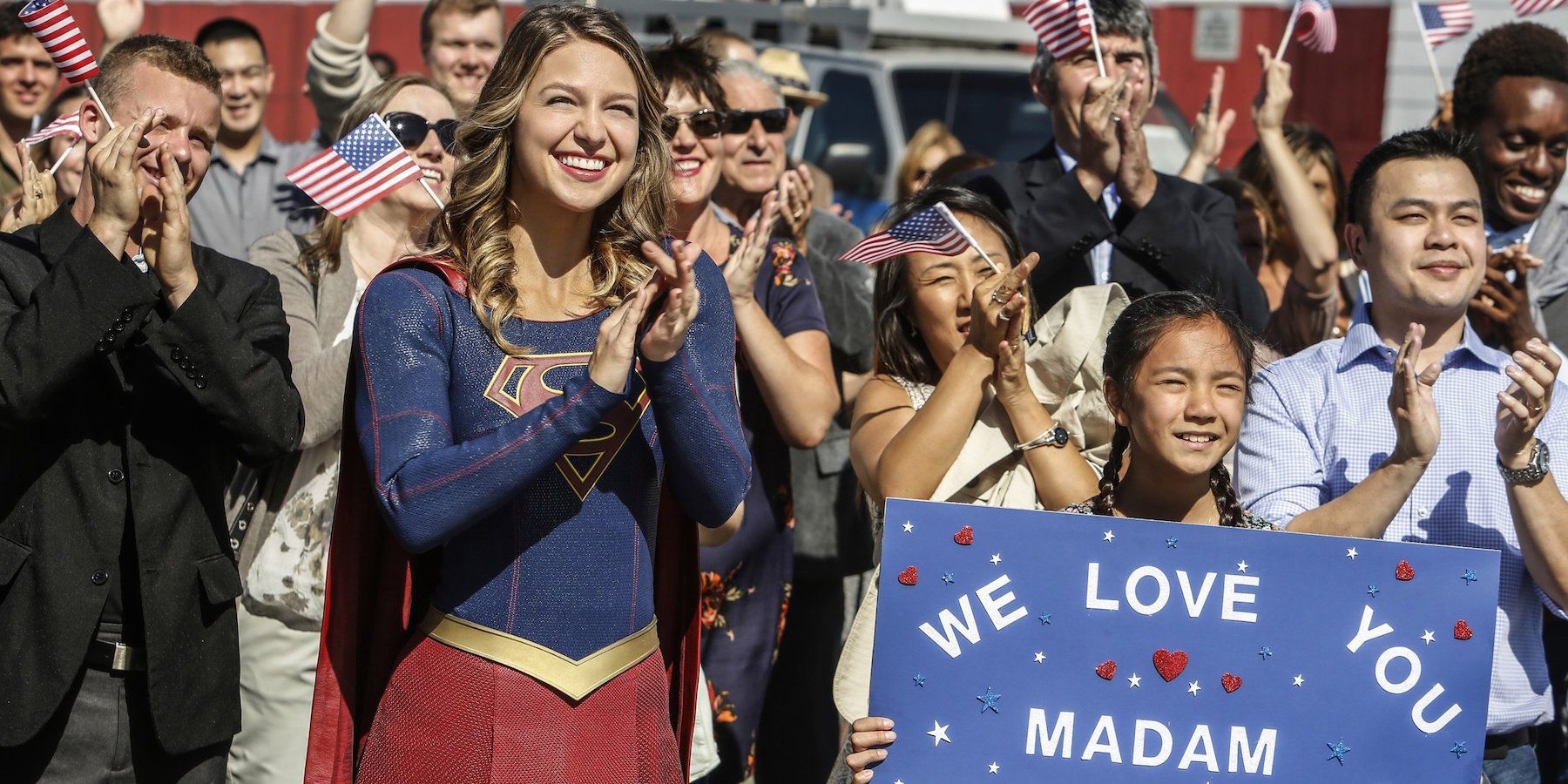Unlike Arrow, Legends of Tomorrow and The Flash, all of which started out life on The CW with a prominent focus on superhero melodrama as their primary concern, Supergirl originally launched on the more conventional CBS network. And while it's been clear from the start of season 2 that a concerted effort is underway to bring the series more in line with the other DC properties on its new home, it's also clear that a certain amount of that TV traditionalism is baked into the show's DNA: Supergirl was conceived as a millennial coming-of-age story about a young woman finding her place as a professional, who just so happens to also be The Girl of Steel.
Part of that means adhering to a setup where superhero-action and "big idea" DCEU mythmaking is accompanied by parallel storylines grounded either in Kara's adjacent workplace (or personal life) difficulties and, occasionally, topical scenarios that comment on real world events. And season 2's third episode, "Welcome to Earth," has confirmed a lot of early predictions that the series would indeed continue to deploy the ever-popular (and currently in vogue) "superhumans as persecuted minorities" storyline.
Where Agents of S.H.I.E.L.D found in Marvel's Inhumans franchise a more direct analogue to the X-films' Mutants, Supergirl has found it's topicality in doubling-down on the idea of its heroine (and Superman's) Kryptonian-immigrant backstories as a way to stage a superhero-flavored exploration of contemporary controversies about immigration policy and management of refugee policies. Whereas season 1 presented the idea of other aliens arriving on Earth mainly in the context of Kara coping with the ghosts of Krypton's past coming back to haunt her, season 2 so far has focused on incognito good aliens like Kara, a public that's increasingly nervous about their presence, and a government looking to set policy around them.
To that end, "Welcome to Earth" introduced former Wonder Woman ("You should see my other jet!") Lynda Carter as a female president whose fashion sensibilities, politics and - unavoidably, perhaps - her gender seem calculated to remind audiences of current presumed real-life Presidential frontrunner Hillary Clinton ("How could anyone have voted for that other guy?," Kara muses out loud), and whose aggressively pro-alien policies are laid out in terms of unmistakably topical political language: She plans to sign a bill granting Earth-dwelling aliens living in the United States amnesty.
Once the "A-word" gets dropped, the episode is off to the races setting up Supergirl versions of real-life immigration policy arguments to play out among the characters. Super-optimist Kara is enthusiastically for it; Alex Danvers and J'onn J'onzz (despite being an alien himself) have their logistical/national security doubts on the matter; Lena Luthor wants to profit from the situation by way of a device that can detect who is and isn't truly human (uh-oh); and Kara's newsroom supervisor Snapper Carr gives her a brutal talking-to about unbiased journalism when she proudly hands in an aggressively negative "report" about the device, cast in expressly political language decrying anti-alien sentiment as "right wing xenophobia." Series newcomer Floriana Lima as Detective Maggie Sawyer even opines that she empathizes with persecuted aliens, having grown up as a "not white, not straight girl" in rural Nebraska, in case any viewers needed the battle-lines drawn any more clearly.
Using science fiction genre trappings to explore these sorts of issues isn't exactly new territory (Alien Nation, currently getting a remake of its own, mined an aliens-as-immigrants storyline for a movie and a TV series over a decade ago), but it's nonetheless surprising to see Supergirl - a series that, like its main character, is occasionally heartwarming and inoffensive to the point of self-parody - not only opt to stake out a position on one of the most incendiary issues associated with the current presidential election, but to also try unexpectedly hard to be complex and nuanced about it, at least in terms of the main characters' reactions.
It turns out Kara's default super-progressivism goes (however briefly) out the window in favor of super-racism shockingly fast when fugitive alien Mon-El (Chris Wood), initially suspected of an attempted heat-vision assassination of the President, turns out to be a Damaxite: a race long considered an enemy people on Krypton. Meanwhile, the actual would-be assassin is revealed to be a fire-powered alien who believes that the amnesty bill is a ploy to trick aliens into revealing their identities to the government. Sawyer may or may not have Alex questioning her sexuality, but the elder Danvers sister much more definitively adjusts her views about alien paranoia after the detective brings her to an out-of-the-way dive bar where aliens comfortably wear their true faces.
While it's still very much Supergirl's story (immigration metaphors have always been unavoidable in the Superman mythos), thus far the character most interestingly affected by this segue into topicality has been David Harewood's J'onn J'onzz. An alien himself, he's nonetheless reflexively wary of alien visitors to Earth as his own race, the Green Martians, were wiped out in an invasion of Mars' surface by the subterranean White Martians. Of all the characters on every side of Supergirl's new favorite talking-point, he's the one who's reacting less out of emotion and more out of personal experience (on both fronts), so it's appropriate for the episode to conclude with his visit to the alien bar and mutually-shocked discovery of Sharon Leal as a fellow Martian ("Miss Martian," in fact) as its biggest cliffhanger.
On the other hand, complexity can be where sci-fi allegories break down on inspection. Going back to the X-Men example, it's best not to think too hard about whether having the power to destroy a city with one's mind is a proper parallel for being gay (see also: Captain America: Civil War, where individual-autonomy is argued for in terms of The Avengers' "right" to exact vigilante justice through godlike powers unchecked by regulatory oversight). Supergirl is clearly trying to make a point about real-life debates over national borders, immigration policy, refugee asylum laws etc; but it's also trying to tell a superhero story within that context - and those two needs can trip each other up under even the best of circumstances.
What's to be made, for example, of one of the episode's other big post-climactic reveals, where Carter's POTUS is shown to be an alien-in-disguise herself? In pure superhero-storytelling terms, it's a sensible twist: Unexpected, lots of story potential, raises interesting questions and creates exciting possibilities (scaly pink skin, shiny eyes - is she an Ungaran, an alien race usually associated with the Green Lantern franchise?) and challenges for the main characters to navigate - particular Kara, who has rather clearly wasted no time zeroing-in on President Marsdin as a new potential Surrogate Mom now that Cat Grant has departed the series.
But Supergirl also wants you to be thinking of these events in connection to contemporary real-world issues, and that could cast the reveal in potential troubling hues for some viewers. Setting aside the more obvious parallels to David Icke's so-called "Reptilian Conspiracy" theory, an aggressively pro-immigration/amnesty President being a "secret alien" herself is likely going to read uncomfortably close to accusations of covered-up foreign origins and forged birth certificates that dogged the tenure of soon-to-be outgoing real life President Barack Obama... which would seem like the opposite of the intended effect from a show that's building this character's story on a foundation of "Hillary Clinton as played by Wonder Woman."
Still, there's a lot of season 2 left to go, and if Supergirl does remain committed to keeping one foot more thematically in the real world than the other "Arrowverse" shows then it's probably better to confront these kinds of questions head on. If nothing else, it should make for interesting viewing going forward.
Supergirl continues Monday, October 31 with ‘Survivors’ at 8pm on The CW.



